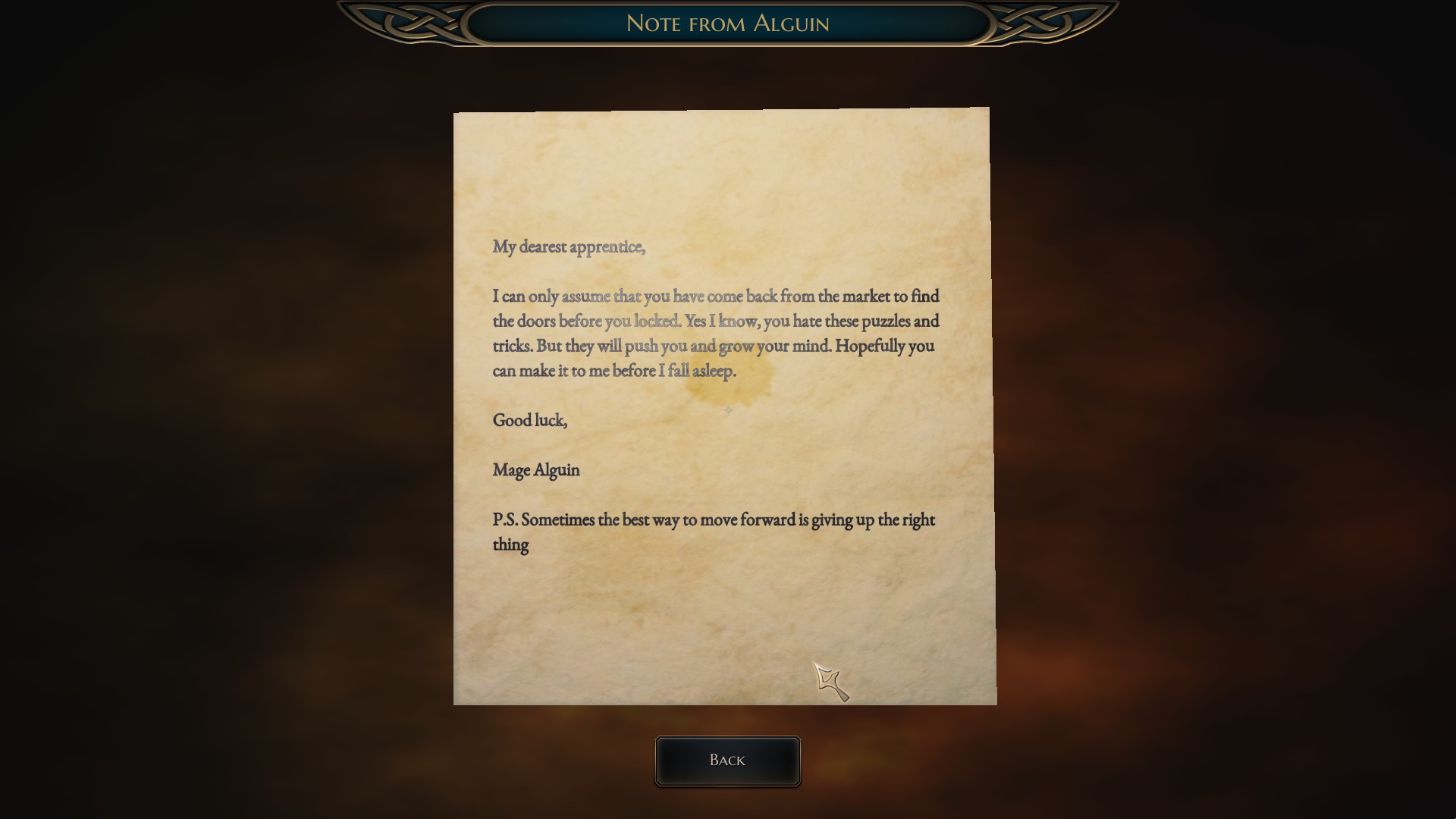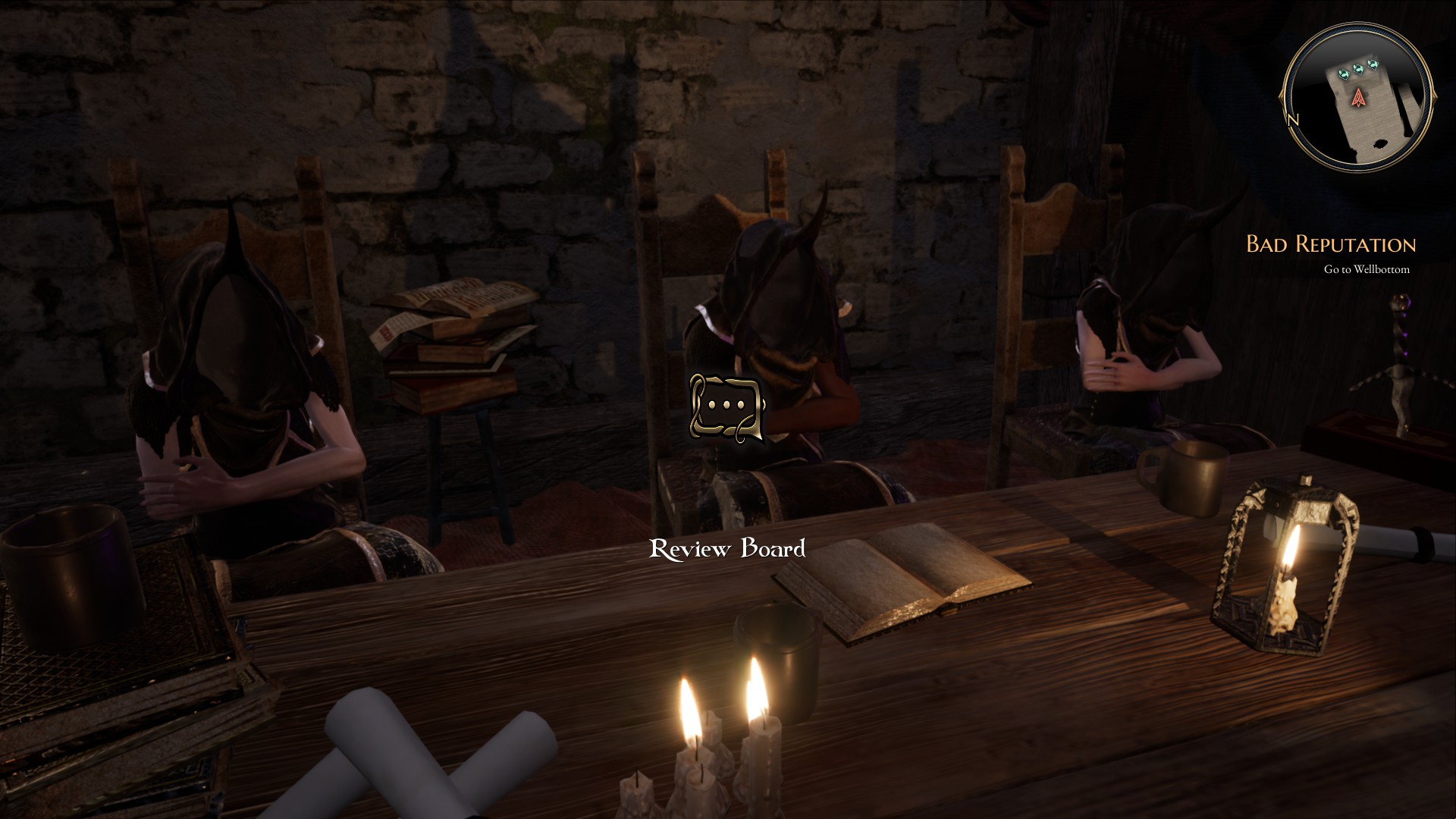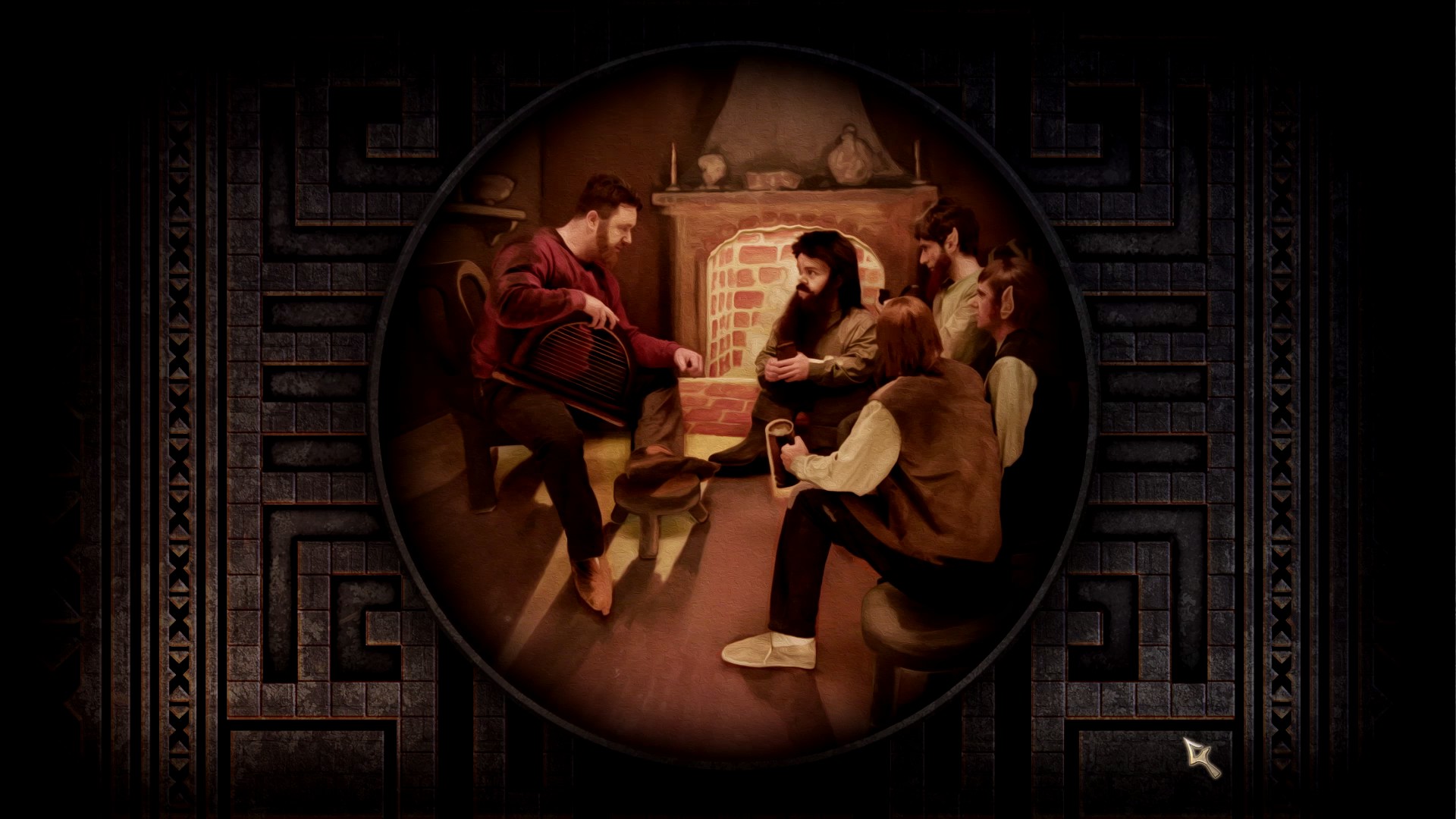
Harken my words, O children of games, to the tale I tell today.
A tale of bugs, glitches, and issues, down in Skara Brae!
Though InXile did work and toil, with updates by the day,
thrice did major patches the game receive, yet remained in disarray.
The Bard’s Tale IV: Barrows Deep was… unexpected for me. The original games were all released before I was even born, and though that’s not usually a barrier for me when it comes to playing new things, I’ve never had cause to go back to them. Indeed, my only experience with the series was the 2004 The Bard’s Tale, which, as it happens, is nothing like the others in the series. Entering into a game with unfulfilled expectations can be a hindrance to enjoying it, this is true, but Bard’s Tale IV has many problems besides. There are some beautiful aspects to this game that make me wish I could love it more than I do, but, as it stands, it’s a hot mess of bugs and nostalgia-driven, antiquated design.

I also just miss Carey Ewles as the voice of the protagonist, I won’t lie.
The events of Bard’s Tale IV take place sometime after the original trilogy, with Skara Brae having been rebuilt and its peoples returned. An evil wizard starts making moves, a God-fearing cult springs up, adventurers and non-humans are in danger, and you can probably already see where this is going. The world borrows heavily from Celtic lore and history – Skara Brae is itself a very real place, if not exactly as it appears in the games. In this way, the narrative is a combination of high and low fantasy, apparently taking place in a fantasy realm while using wholesale the Celtic culture to give its world life. The result can be pretty great at times, with personalities and attitudes of Dwarves, Elves and Trow (not a typo, also not dark elves) feeling like so much more than Tolkienian facsimilies.
With this in mind, the story really does seem like it was written for fans of those old games and wants desperately for you to remember them. This can be a good thing in some ways, and in others not so much. Locations that would have been “visited” back when the game was mostly text and a handful of images are now revisited and given new life. I imagine walking through the locales of some of these old places would tickle many a nostalgia spot. On the other hand, even the brief history of the previous games given in IV’s intro cinematic is enough to make you realise this is one long re-hash. That wouldn’t necessarily be a bad thing except for the fact that, given how much the story telegraphs what is going to happen, you’ll quickly figure out exactly how things will go within the first few hours. There are some twists and nuance, but nothing that feels like it carries significant consequence. The passive world-building is much better than the story being presented, and it’s easy to lose focus of the narrative at all in the face of the game’s technical problems.

Yes, yes it is, Rabbie.
Looking at the game regarding technical soundness and polished presentation, The Bard’s Tale IV is a frustrating experience at best and a complete mess at worst. I encountered all kinds of bugs and glitches all the way through my time with the game, ranging from innocuous, to frustrating, and even game breaking. There were times when I’d try to interact with an item, over and over, until the game finally felt like acknowledging my input. Sometimes it did not. The loading times are just long enough for me to grab myself a drink and come back in time for it to have loaded into the next area. Opening a menu at the wrong time could mean missing a cutscene, leaving whatever is happening to play out behind a now unclosable menu until the scene is over. This also stretches into things you would think would be difficult to miss during QA testing. Things like having NPCs vary wildly in their speaking volume, sounding perfectly fine during one line and then being almost inaudible the next.
The subtitles also leave a lot out of what’s actually being said, particularly for ambient NPC dialogue or cutscenes. Some moments are just outright untranscribed, and, when combined with the aforementioned audio problems, it’s easy to miss what’s going on. And, of course, the game just occasionally stops working at all, with story cutscenes triggering before everyone in the world freezes in place, refusing to move until you reload. This, and the random crashing for seemingly no reason, are particularly infuriating aspects when considering the physical save markers present in this title. The insane part is that this is still true after three major patches, the latest of which was 17GB and was meant to specifically address many of these complaints.

The patch notes for this game read like a note from Alguin. That’ll be funny when (if) you play this.
To my mind, a lot of The Bard’s Tale IV’s design is nostalgia for nostalgia’s sake. This includes things like physical save markers scattered across the world, with no other method of saving the game. Stuff like skill points being permanently assigned, with no way to re-spec your characters. Completely arse-up a puzzle, having to undo your mistakes before you can re-attempt? Unless you miraculously saved immediately before, too bad – stick it out, or reload and re-do the last ten minutes of progress just to get back to that point. Wanted to experiment with your character load-out to get the best results? Well, you can suck it, because Bard’s Tale IV cares not for your “limited personal time,” and “diminishing patience.”
Once, these elements were the staples of game design but that time has long since past, and I couldn’t give a single toss about “Full Cornishman” gamers that extol the virtues of such frustrating design in modern times. These things aren’t fun anymore, they’re frustrating, especially when they’re forced upon you, and just because they were fun once doesn’t make it so anymore. Most games that do incorporate these elements nowadays do so with tweaks to make them more palatable or, better yet, entirely optional. Anything that absolutely enforces these “harder than brass tacks” mechanics with no alteration is effectively niche, and that’s a huge barrier to actually enjoying what could have otherwise been a fantastic game. These “features” also very quickly stop being selling points when they exacerbate the overbearing technical problems of the game.

“Ah, hero! I’m glad you’re here, but first, allow me and the rest of the tavern to stroke off for a minute.”
I also have to convey my disappointment with the combat system. Given that it was inXile developing this game, when I heard “tactical, turn-based combat” I expected something akin to Wasteland 2 but the reality is closer to Mega Man Battle Network. Combat fields are simple 4×4 grids, split in two for your play area and the enemies’, and a very restrictive pool of actions, especially compared to enemies that (theoretically) should only be slightly more powerful than you. Whatever tactical depth it might have had is significantly reduced by the aforementioned design problems. It’s made worse still that difficulty progression is like scaling a sheer cliff, with mandatory battles being stupidly hard compared to whatever immediately preceded it. That, again, is made worse for the fact that you could be making crap decisions with your character building without knowing it until you have to put them to the test, by which point it’s too late to do anything about.
The presentation is also jarring, with the abilities bar being smack bang in the centre of your own playing field, a constant irritant throughout my playthrough. Of course, the technical problems I mentioned earlier creep into this aspect of the game, as well. Animations that are meant to indicate what’s happening at any given point have display issues that make it difficult to see the status of the battle at a glance. Even just trying to select the right tile/character can become a meta-game in itself, one of “Where will the game accept input now?” It’s one thing to have a poorly designed combat system, and another entirely to have to fight with the game just to get it to work. This is, of course, assuming that the field is actually displaying as it should since stuff like this wasn’t an uncommon occurrence either:

“GREETINGS, FOOLISH HEROES, IT IS I – OBSCURIO!”
The thing that sucks about all of this is that, beneath it all, there’s the potential for an excellent game here. The puzzle design, arguably the most significant aspect of the game, has considerable variety, from block-pushing puzzles to riddles that actually require some lateral thinking. There are even puzzle weapons where you have to fiddle around with magic weapons to find hidden triggers, hidden behind riddles one must solve to unlock their full potential. This aspect of the game’s design makes for a much more entertaining dungeon crawler experience, providing some food for thought rather than just some bodies to hack. Even the battle combat system wouldn’t be so bad if it allowed a bit more experimentation on the player’s part by giving you a chance to re-spend points, as most battles can’t just be won by hitting things until they fall over. It’s honestly quite refreshing, and something I’d like to see more of in a time where a lot of games in this same genre that do use puzzles will only have one kind that they endlessly recycle.
Besides that, this game can pull some haughty guffaws from me when it wants to, and though the story it tells isn’t amazing, the writing around it is excellent. The distinct personalities of each character make for some hilarious interactions between them (save for your own character, who may as well be a cardboard cutout.) To be able to unlock your next level of abilities, you have to be assessed by a review board of hooded figures that judge your deeds, who do so in appropriately dramatic fashion. Running gags, witty one-liners, cleverly written notes that play-off whatever is happening at the time, Bard’s Tale IV has all of this and more.

Like “subtle” self-references.
What stands out the most about The Bard’s Tale, and appropriately so, is its music, and not strictly in the background soundtrack. As you walk around Skara Brae and other areas, you’ll continuously hear the humming, whistling, and singing of its denizens, and some of these little ditties are hauntingly beautiful. There were a few times that I actually stopped to listen because the music was so captivating that I thought it was plot-relevant. It wasn’t, as it would turn out to be just random NPCs that you can’t even speak with, and that’s just amazing to me, as someone who rarely notices game music in general without explicitly listening for it.
Music carries into so many aspects of the game, as well, from the songs of exploration that you’ll sing to open new parts of the environment, to the role it plays in some of the puzzles. It permeates the very essence of the game, right down to the opening screen, itself a live-action recreation of the cover of the original Bard’s Tale. Continuing your game or starting a new one will transition from this bard’s singing to him providing a story-telling recap of your exploits thus far. Small things like this show that the love behind this project from the dev team is clearly there, and has manifested in some beautiful ways throughout.

Byodiful.

Despite taking place in a marvellously detailed, humorous, and lively world, the story of The Bard’s Tale IV: Barrows Deep is rather by-the-numbers, and a lot of the game’s design harkens back to the old games in the series in the worst, most rigid ways possible. Further to this, even after a few updates, the game is still fraught with technical issues, but it is slowly being patched, and inXile has a good track record for working on their games to improve them. And the good things that are still present in this game are excellent, like the fantastic writing, refreshing approach to puzzle designs, and beautiful music present throughout. The design could also be tweaked to remove the sting of a lot of the older design tropes that cause the most grief. As it stands, the game in its current state is rough as guts, but there’s a lot of room for improvement, and I’ve faith that it will improve. It will just take time.











